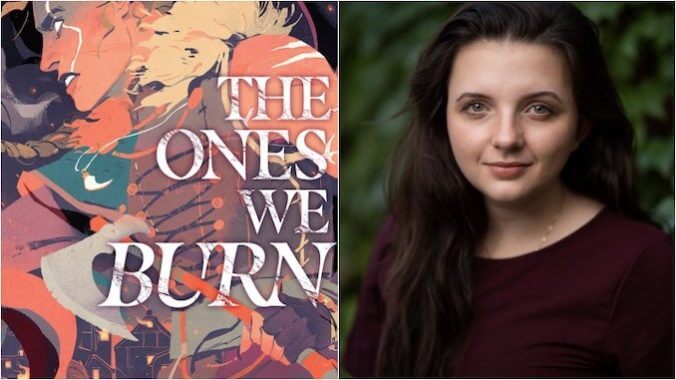Rebecca Mix’s The Ones We Burn Is a Political Fantasy Grounded in Trauma and Healing
Photo: Brian Weitzel Photography
Young adult fantasy often uses outlandish settings and magical characters to explore all too relatable and human questions of identity and belonging. Rebecca Mix’s The Ones We Burn is, on paper, a political fantasy about the uneasy tension between two kingdoms comprised of people who are very different from one another. (Though it ultimately evolves into something much more emotionally complex.) The magical denizens of Witchik and the largely mortal humans of Isodal once had a fruitful connection between their lands but have since grown distrustful and fearful of one another—despite the fact that the equally magical Skybreaker kings have sat on the throne of Isodal for years.
The novel follows the story of Ranka, a young blood witch who is chosen to serve as a political bride to keep the peace between the witch clans and the human world. But when she arrives in the capital city of Seaswept—armed with a plot to find a missing witch and assassinate the man she’s meant to marry—Ranka learns that nothing is what she expected. As she begins to question whether she has a chance at a future that doesn’t involve being an unstoppable killing machine for those who claim her loyalty, she’s also forced to confront her own past—which may have much darker elements than she’s been willing to really let herself remember.
As a character, Ranka’s arc has familiar elements from many other YA fantasies. A lost girl with a deadly magical gift she didn’t ask for and can’t entirely control, she has many sisters within this genre space. But Mix still manages to find something new to explore by honing in on the horrific trauma at the heart of her story in ways that many books like this one often choose to ignore. Because while Ranka may be a uniquely powerful chosen one with a rare gift, she’s also a young girl struggling to process an unimaginable amount of emotional damage, rooted in the abuse she’s suffered at the hands of those who were meant to love her best.
We got the chance to chat with Mix herself about the complex themes of The Ones We Burn, Ranka’s journey toward healing, her relationship with Aramis, and the worldbuilding we didn’t get to see.
![]()
Paste Magazine: Tell me a little about where the idea for The Ones We Burn came from.
Rebecca Mix: I love reluctant anti-heroes, and I love flipping tropes around. “Girl is sent to kill the prince she’s (probably) betrothed to” is such a classic YA trope, and I just thought the idea of a girl being confident she won’t fall for the prince and then immediately mucking everything up by falling for his sister would be a blast to write. There are also a lot of my own experiences woven through this story—but those came later. So much of this book is really just a love letter to all the YA fantasy that made me a reader.
Paste: How would you describe this story? Do you consider it a political fantasy? A coming-of-age story? Something else entirely?
Mix: For me, The Ones We Burn is ultimately a story about what it means to be a child of abuse undergoing the very painful, confusing process of questioning your experiences, reckoning with what happened to you, and trying to figure out how the hell you move on, heal, and break the cycle—with some witches, magic, and madness thrown in. It’s also a story about chronic illness, and what it means to suffer a total betrayal of a body.
The political angle came later—I love political fantasy stories, and I’m fascinated by what power reveals about us, but the heart of this story has always been that terrifying experience of being a very hurt child transitioning to adulthood, and realizing the ones charged with protecting you may have actually been the ones doing the most harm.
Paste: Ranka is such an unexpected heroine for a book like this—she’s basically just this feral girl who wants to go live by herself in the woods. (Which, honestly? Relatable.) How did her journey come together for you?
-

-

-

-

-

-

-

-

-

-

-

-

-

-

-

-

-

-

-

-

-

-

-

-

-

-

-

-

-

-

-

-

-

-

-

-

-

-

-

-








































